Do Croton Plants Like Coffee Grounds?
The best thing about coffee grounds is that they are readily available in houses as many people consume coffee as a beverage. However, it is also popular in the houseplant community as it is high in Nitrogen and boosts growth in plants. So the question is, do croton plants like coffee grounds? Let’s find out.
As a general rule, coffee grounds are rich in nitrogen which will benefit the croton’s growth. Also, the coffee ground makes the soil acidic, which is preferred by crotons. But you must not add coffee ground directly over the soil as that can lead to several problems in croton plants.
You must learn the correct way of using coffee grounds on your Croton, or else the plant can get hurt.
Today I will discuss the pros and cons of using coffee grounds on Crotons and the right way of using them so you can avoid the cons.

Please note: Simplify Plants is reader-supported. Some links in the post are affiliate links and I get a commission from purchases made through links in the post.
Are coffee grounds good for Croton?
To answer the question, yes, coffee grounds are good for Crotons.
This is because of two reasons:
- Coffee grounds add nitrogen to the soil.
- Coffee grounds make the soil acidic.
Crotons prefer both acidity and high Nitrogen.
However, if the soil is already acidic, adding too many coffee grounds will increase the acidity even more, which might be an issue.
So, consider checking the soil pH before adding coffee grounds to the soil.
Coffee grounds are readily available in households, which is why people want to use them on their houseplants.
If you use the coffee grounds correctly, your Croton will highly benefit from it.
You might see more growth, or the soil might hold more moisture due to the application of coffee grounds.
So, you can use coffee grounds on your Croton instead of throwing them away.
How often should I use coffee grounds on my Croton?

Coffee grounds are not meant for regular use, so you should not use them too often.
You must not replace the regular fertilizer with coffee grounds.
When starting, use coffee grounds on the Croton and check its reaction.
If it reacts well and shows growth, you can use coffee grounds once a month.
Since you will fertilize the Croton with a regular fertilizer, you don’t need to add coffee grounds more than once a month.
However, if your Croton doesn’t react well to the coffee grounds and shows any issues, avoid using coffee grounds.
Advantages of using coffee grounds
Let’s understand all the benefits of using coffee grounds on Crotons.
Improves soil quality: Coffee grounds add minerals and essential nutrients like Nitrogen and Potassium to the soil, thus, improving the soil quality.
Encourage growth: Coffee grounds contain high amounts of Nitrogen which is responsible for boosting the foliage growth of plants.
Loosens the soil: Coffee grounds are great at improving the texture and loosening the particles, allowing proper airflow in the soil, and helping the roots breathe and remain healthy.
Increase moisture retention: Crotons require moist soil to stay healthy. If the soil doesn’t retain water very well, coffee grounds can be of immense help as they will increase the retention capacity of the soil.
Improve water drainage: The organic matter present in coffee grounds are responsible for improving the drainage capacity of the soil.
Waste reduction: You don’t usually have any use of used coffee grounds, so you throw them away. But adding those to the Croton instead of throwing them away will reduce waste.
Repel cats: Croton is a toxic plant, and if you have a cat, you would want to keep it away from the plant. Adding coffee grounds to the soil will do the trick as cats don’t like their smell and, therefore, will stay away.
So, now you know all the benefits that your Croton will get from the application of coffee grounds.
However, you need to be careful and use them the right way, or the plant might experience the following disadvantages.
What are the cons of using coffee grounds?
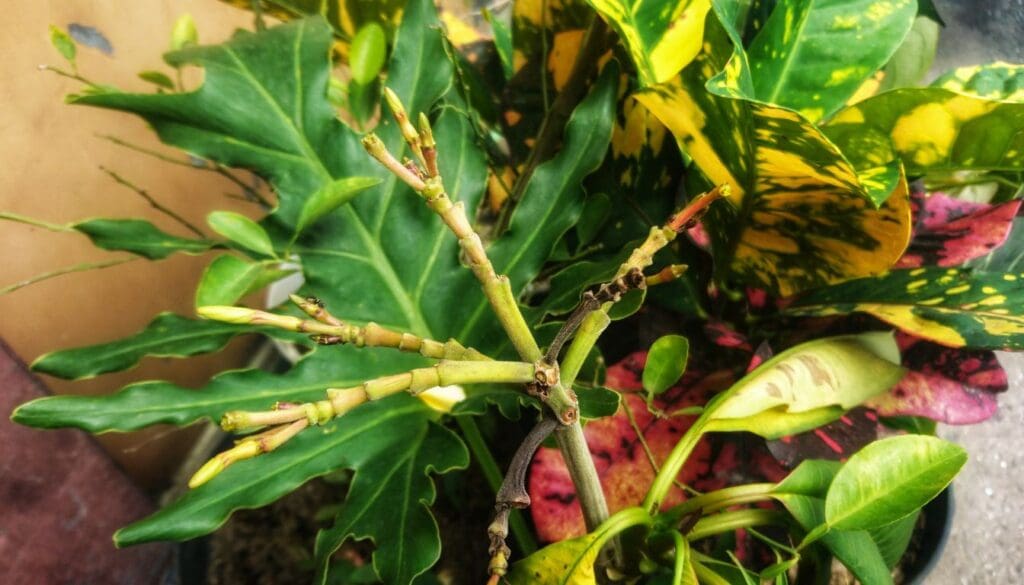
If you don’t learn how to use coffee grounds on your Croton, the plant might undergo different problems, which I have mentioned here.
Excess moisture retention: If you already use soil that retains the required moisture for your Croton, using coffee grounds can increase the retention even more, mainly if you use them in large quantities. This can make the soil soggy.
Excess acidity: I already mentioned that you should check the soil’s pH level before adding coffee grounds. Adding coffee grounds to an already acidic soil will increase the acidity, making it unsuitable for Croton.
Stunted growth: Using coffee grounds in large quantities is deadly as it can stop root growth in plants that will, in turn, stunt the growth of the plants.
Pest infestation: Most pests enjoy a moist environment. Using too many coffee grounds might attract pests like mealybugs, scales, and thrips.
Fungal diseases: Fungal diseases can occur if you add coffee grounds directly to the soil of your Croton. This will promote fungal growth, which will eventually infect the entire plant.
Stops seedling growth: When the coffee grounds are added to seedlings, they do more harm than good. This is because coffee grounds are unsuitable for seedlings and young plants. Too many coffee grounds can stop their growth.
Unhealthy for dogs: Coffee grounds are not suitable for dogs. If you have a pet dog who can go near your houseplants, avoid adding coffee grounds to the soil. If your dog consumes coffee grounds, it will develop health issues.
You can avoid all these if you use coffee grounds correctly on your Croton and other houseplants.
What is the best way of using coffee grounds on Croton?
There are different methods of using coffee grounds on Croton plants. Let’s discuss.
Coffee grounds as compost

Adding coffee grounds to the compost is an excellent way of using them.
Coffee grounds are a great source of Nitrogen, but they don’t contain all the nutrients that a plant needs.
So, you shouldn’t just use coffee grounds as compost but also add other matter to make it nutrient-rich overall.
You can go all organic and add coffee grounds to the kitchen waste to make compost for your Croton out of them.
Along with all the other matter, add 20% coffee grounds as more than that might be harmful to the plant.
Like mulching, you don’t put a layer of compost on the soil but mix it with the soil.
Therefore, you can add the compost to the soil while repotting the Croton.
Or, you can mix it with the soil once a month to ensure your Croton gets all the benefits of the coffee grounds and the other nutrients.
Coffee grounds as a mulch
Mulching is a better way of using coffee grounds instead of adding them directly to the soil.
Although mulching is mainly practiced for outdoor plants, you can also do it for your potted Croton.
Mulching is also great for Crotons that are growing in the gardens.
In mulching, you add a layer of mulch over the soil instead of mixing it with the soil in composting.
You can mix organic matter such as dried bark, dead leaves, wood chips, and coffee grounds and layer it over the soil.
Mulching is an excellent way of increasing moisture retention and keeping the soil moist and warm.
But be careful while mixing everything as you don’t want to add too many coffee grounds as they can stunt your Croton’s growth.
Since Croton is a humidity-loving plant, mulching can help the plant retain moisture.
Coffee grounds as liquid fertilizer
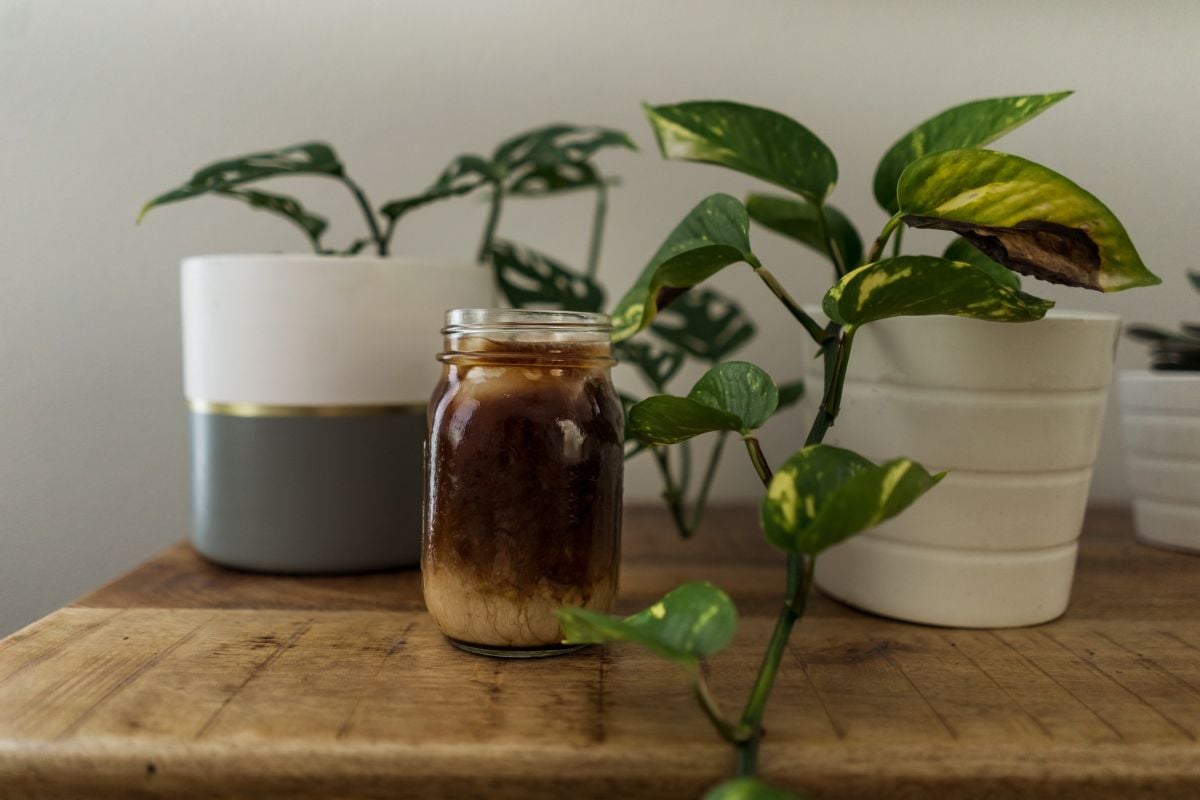
Applying coffee grounds as a liquid fertilizer is ideal for houseplants.
If you don’t know how to make a liquid fertilizer out of coffee grounds, don’t worry, as I am here with the steps.
- First of all, you need a bowl and add some water to it.
- Now put the bowl on the gas and turn it on.
- Let the water simmer for a while.
- After that, turn off the gas and allow the water to come to room temperature.
- Now add the coffee grounds to the water and leave the mixture aside for some days.
- The coffee grounds will start breaking and adding nutrients to the water.
- Strain the water into a spray bottle.
- Now you can use this as a liquid fertilizer.
Since the coffee grounds get diluted in water, this reduces the harmful effects and, therefore, is the best way of using coffee grounds.
You can apply this to your Croton once a month.
Can I water my Croton with leftover coffee?
Many people use their leftover coffee to water their houseplants.
But is it the correct way of using coffee grounds? The answer is no. Here’s why:
- First of all, if you pour hot coffee, it will shock the Croton and burn its roots.
- A cup of coffee has a lot of caffeine which can reduce the growth of your Croton instead of boosting it.
- Excess caffeine will also increase the acidity of the soil.
- If you pour the leftover coffee on the leaves, they will burn.
- And you might overwater your Croton if you pour leftover coffee on it.
Final words

Since Croton prefers acidic soil and benefits from high nitrogen fertilizers, coffee grounds will be suitable for them. If you can use them the right way, you can avoid all the harmful effects of using coffee grounds.
You must avoid adding coffee grounds directly to the soil or pouring leftover coffee. Using too many coffee grounds or adding it too frequently is also a big NO.
Avoid applying coffee grounds too frequently and check Croton’s reaction after adding coffee grounds to the soil. If the plant reacts well, continue using or else stop. The best ways of applying coffee grounds on Croton are – composting, mulching, or liquid fertilizer.
Reference: Sciencedirect, Wikipedia, Wikipedia, Britannica, CABI, Academia, University of South Florida, The University of Georgia.
Recommended Garden Supplies
| Product Image | Our Recommended Gardening Supplies | Check Offers! |
|---|---|---|
Top Top
Top
Top
Top
Top
Top
Top
Top | rePotme Houseplant and Tropical Classic Potting Soil Mix | Check Offer On Amazon |
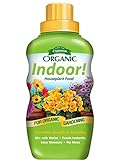 Top
Top
Top
Top
Top
Top
Top
Top | Espoma Organic Indoor Plant Food | Check Offer On Amazon |
 Top
Top
Top
Top
Top
Top
Top
Top | GooingTop LED Grow Light 6000K Full Spectrum Clip Plant Growing Lamp | Check Offer On Amazon |
 Top
Top
Top
Top
Top
Top
Top
Top | Soil Moisture Meter | Check Offer On Amazon |
 Top
Top
Top
Top
Top
Top
Top
Top | Govee Hygrometer Thermometer, Bluetooth Enabled! | Check Offer On Amazon |
 Top
Top | LEVOIT Humidifiers for Large Room(Best For Plants) | Check Offer On Amazon |
 Top
Top
Top
Top
Top
Top
Top
Top | Upgraded DIY Automatic Drip Irrigation Kit, 15 Potted Houseplants Support | Check Offer On Amazon |
 Top
Top
Top
Top
Top
Top
Top
Top | Stainless Steel Heavy Duty Gardening Tool Set | Check Offer On Amazon |
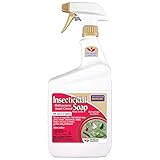 Top
Top
Top
Top
Top
Top
Top
Top | Bonide Insecticidal Soap | Check Offer On Amazon |
 Top
Top
Top
Top
Top
Top
Top
Top | Bonide 32 oz Spray Neem Oil for Organic Gardening | Check Offer On Amazon |
 Top
Top
Top
Top
Top
Top
Top
Top | Garden Safe Fungicide | Check Offer On Amazon |





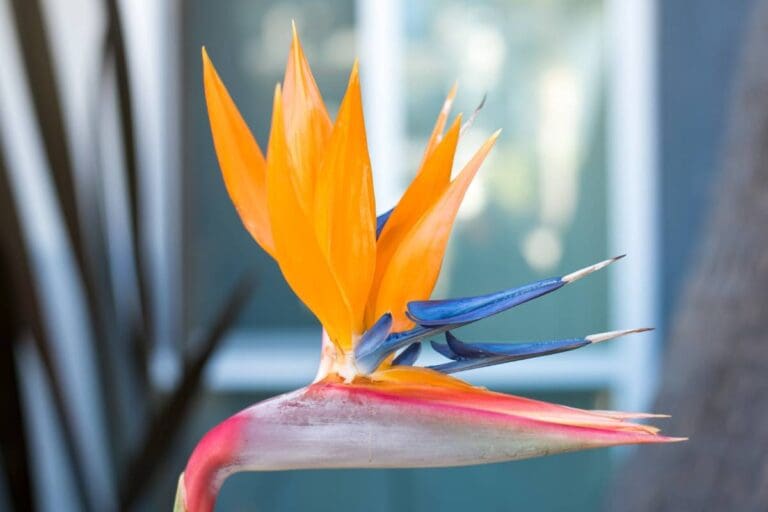
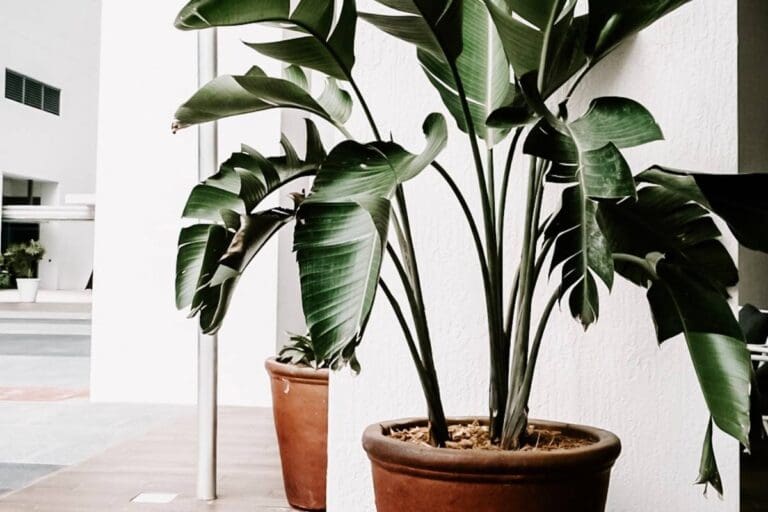
About the liquid fertilizer part : when adding the coffee grounds are we adding used coffee grounds or not used coffee grounds?
Please try to get back to me asap. Found this article very helpful! Thank you!
Hey thanks for going through the article.
Used coffee ground is what we meant in the article.
However, for best results i would suggest using it occasionally and supplementing the plants with a liquid fertilizer.
Hope that helps!